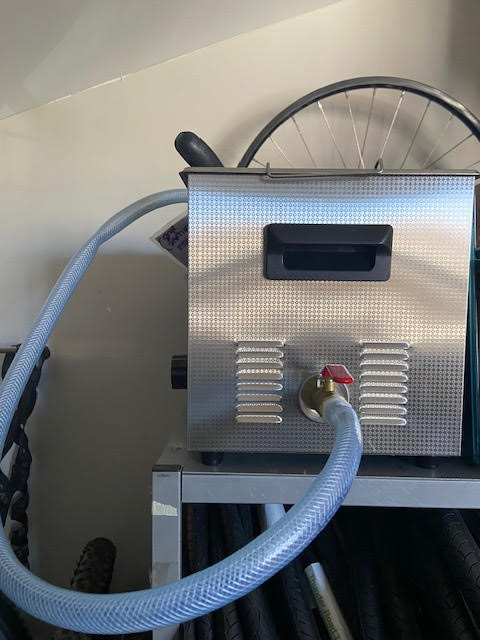We all dream about having a job that lines up with our passions and our values. Thomas, one of Community Cycle’s Professional Bike Mechanics, expressed that one of the reasons he chose to work here is because of his love of bikes, but also because of the non-profit’s commitment to sustainable practices. While Community Cycles daily operations are geared to reducing waste, the non-profit plans on stepping things up on sustainable business practices in 2024 with a new parts washer and the utilization of an eco-degreaser.
Community Cycles is part of a circular economy, taking in donated bikes and parts and reusing them to sell refurbished bikes, tools, and clothing since 2006. Derek, another Professional Bike Mechanic, reminds us that, “We keep a lot of clothing out of the landfill, which CHARM (Center for Hard to Recycle Materials) won’t take. We recycle tires and inner tubes (rubber), plastics, and scrap metal.” A lot of the bike related items that people donate would normally be put in the landfill. We keep a lot of rubber out of the landfill.” In 2023 we kept 6,000 pounds of tubes and tires out of the landfill!
One of the most damaging factors to both human and environmental health in a bike shop can be what to do with all the grease and petroleum that must be removed from the bike parts and tools. Traditionally a degreaser/solvent is used to wash parts. This can be harmful to skin and the respiratory system, needs to be used with a hood, and requires an outside source to process and remove the dirty water as required by OSHA.
However, Community Cycles is in the process of utilizing both a new eco-degreaser and an ultra-sonic cleaner, much like those used to clean the decades old grime off grandma’s old jewelry. The machine used ultrasonic waves through water to disturb or knock debris off an object. Not only was the old way of cleaning toxic, but also time consuming. For the ultrasonic cleaner, it can clean many tools in 15-30 minutes and the mechanic does not need to touch the tool during the process. Thomas stated, “That you can even fit an entire drive train in an ultrasonic machine, which is the dirtiest part of a bike, and is a much less harmful way to clean parts and much more convenient.”

As for the larger parts washer, Community Cycles will switch to MUC-OFF bike cleaner, which is a sustainable, biodegradable bike cleaner that is also free from acids, solvents and CFC’s which can cause eye, skin, and respiratory irritation. MUC-OFF will also provide refillable pouches instead of plastic bottles for every product order. The product, which can be locally sourced, will be gentler for staff and volunteers, will be non-toxic and non-hazardous for the parts washer and will not require the use of a hood.
Both the use of a non-toxic cleaner and the ultra-sonic cleaning machine will improve the health and safety of employees, volunteers, customers and the building in 2024 and bring Community Cycles that much closer to their sustainability goals.
What’s next? Thomas dreams of solar panels, electric vans and net-zero energy. Some day!

